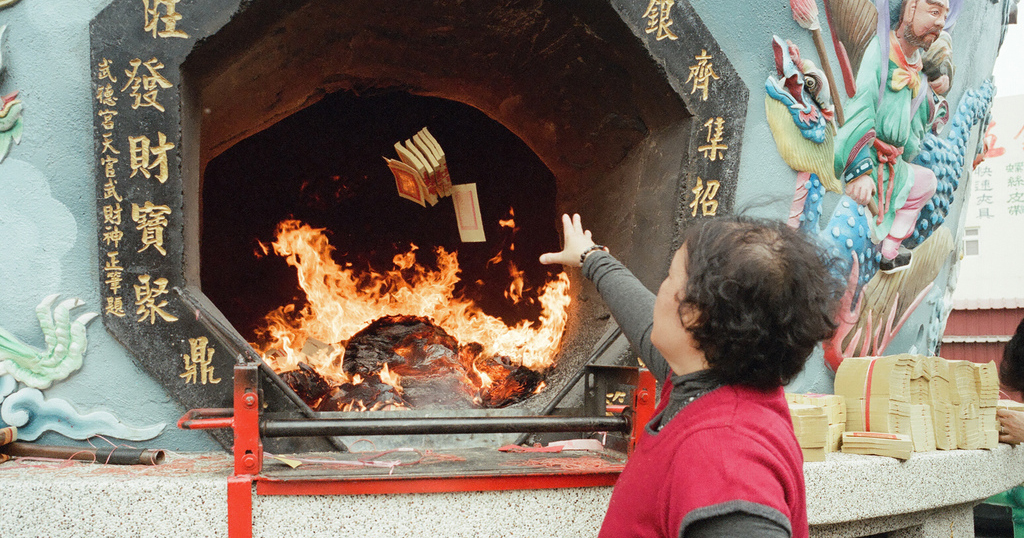During the Hungry Ghost Festival, joss offerings such as paper money and other material possessions in paper form, are burnt.
Many of those who do it believe that spirits will receive these offerings in the afterlife.
In addition, this act keeps the spirits happy, which in turn, brings blessings for the living.
However, given the different schools of thought within the Buddhist and Taoist traditions, different people can hold many different views and beliefs about why they agree or disagree with the practice.
Here's what some Buddhists have to say about the significance and origins of burning offerings.
Symbolise material relinquishment at death
According to a 2014 article by Nalanda Buddhist society in Malaysia, this practice of burning offerings is not for the dead to receive them in the afterlife.
Instead, it is to "show everyone present that all former possessions of the deceased cannot be brought along to the next life".
According to this view, everything that one had ever owned has to be left behind with death.
Thus, the burning of paper offerings is an "effective educational tool" to better understand the concept of impermanence and relinquishment of material possessions at death.
"There is a Chinese saying that ‘no possessions can be brought along to the next existence; the only thing that follows one is his deeds, or ‘karma’ ( 万般带不去,唯有业随身 )... Witnessing how fire consumes every ‘former possession’ of the deceased, even an illiterate peasant or young child was able to understand this sense of total relinquishment at death."
Has its origins in folklore
According to a monk, Venerable Dao Dun, at Hai Inn Temple (a Buddhist monastery in Singapore), he thinks that this practice "[does not] have any (spiritual) meaning to them."
Instead, they are superstitions with roots in Chinese folklore that have become a tradition over time:
“These rituals actually started out from the burning of joss paper in a groundless belief that it will help ancestors pay off evil spirits as they progress through the afterlife.”
Some sources, like this one, also offer a tale on how the practice started.
Whether or not this was an actual event that happened is undetermined:
"A man named Cai Lun invented paper, however the people did not take a fancy to what he created. He pondered very long on how to market his invention and came up with the idea to collaborate with his wife to stage his death and bury him for seven days. Breathing through a tube while buried in a coffin, Cai Lun managed to stay alive for seven days, all the while his wife was burning away his stockpiles of paper. She pretended to blame the husband’s death on the paper because he was depressed about not being able to sell his invention and his health deteriorated. On the seventh day, Cai Lun miraculously came back alive from his grave and everyone attributed his resurrection to the burning of his invention, paper. And from then on, the belief spread far and wide among the Chinese. Whether this event actually happened, no one knows for sure."
[related_story]
Discouraging the practice of burning
Given the belief that this practice is folklore or superstition, some Buddhists do not believe in burning paper money at all.
They think that the deceased would have no interest in worldly items, and besides, burning offerings isn't good for the environment.
For instance, the Buddhist Sangha of Vietnam issued an official statement in February 2018, declaring that the Sangha "rejects the practice" of burning offerings.
They also "urged local followers" to cease such activities.
Mindset is the most important
In Singapore, the practice of burning offerings remain very much alive.
However, in line with environmental reasons, some Taoist and Buddhist institutions have issued some new guidelines on the burning of offerings in 2017, such as banning the burning of large paper box offerings.
One monk, Venerable Chuan Sheng, also explained that it is not the offerings in themselves that are important.
Instead, it is "more of the mindset that matters":
"From a Buddhist perspective, it is more of the mindset that matters in terms of such offerings... It does not matter very much how big or the quantity of the offering, but as long as the mindset is pure, sincere and full of gratitude and filial piety towards ancestors, that is much more important."
Top photo from Flickr user Wunkai
Content that keeps Mothership.sg going
??
What to do for weekend ah? Here are some nice places to chill this week.
???
We can't guarantee that you'll see chocolate chip cookies, peperoni pizza, or strawberries quite the same way ever again...
?
Travel Malaysia like a boss with these tips.
??
Our writer "went from apprehensive to really enjoying it": find out what "it" is.
If you like what you read, follow us on Facebook, Instagram, Twitter and Telegram to get the latest updates.
